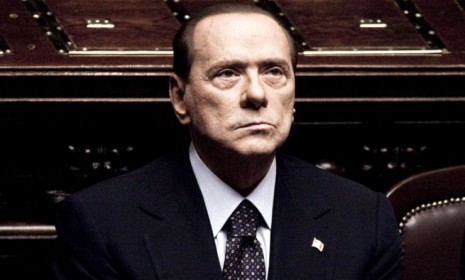Will getting rid of Berlusconi solve Italy's debt problems?
Italy's controversial prime minister bows to pressure and promises to resign — but analysts worry it won't be enough to save the debt-plagued nation

A free daily email with the biggest news stories of the day – and the best features from TheWeek.com
You are now subscribed
Your newsletter sign-up was successful
On Tuesday, colorfully controversial Italian Prime Minister Silvio Berlusconi agreed to resign, as soon as lawmakers pass an austerity plan intended to keep the floundering southern European nation from defaulting on its debts. Berlusconi, long dogged by sex scandals and corruption charges, is considered a major cause of the country's political gridlock, and news of his promised departure sparked a brief rally in world markets. But stocks plunged early Wednesday as investors continued to worry about Italy's uncertain future. Will replacing Berlusconi make it easier to pull Italy — and Europe — back from the brink of collapse?
No. Italy's problems are bigger than Berlusconi: "Ousting Silvio Berlusconi won't make Italy's fiscal mess any easier," says Peter Morici at The Street. "With or without him, its debt is impossible and Italy is headed for default." Italy has borrowed so much money to pay for its extensive social benefits — its total debt is now 130 percent of GDP — that no budget cuts, no matter how deep, will "bring its books into balance. It is simply too late."
"Berlusconi ouster can't avert default"
The Week
Escape your echo chamber. Get the facts behind the news, plus analysis from multiple perspectives.

Sign up for The Week's Free Newsletters
From our morning news briefing to a weekly Good News Newsletter, get the best of The Week delivered directly to your inbox.
From our morning news briefing to a weekly Good News Newsletter, get the best of The Week delivered directly to your inbox.
Actually, this just might help: "The political change is a big deal," says Megan McArdle at The Atlantic. The hope is that pushing out Berlusconi will "convey seriousness about fiscal restructuring, [and] a commitment to making Europe work." Maybe removing such a lightning rod will "make possible the tough fiscal measures" needed to stop borrowing rates from skyrocketing. And "it hasn't come a moment too soon" — with interest on 10-year Italian bonds at the "tipping point" of 7 percent, Italy won't be able to borrow enough money to stay afloat much longer.
"Can Berlusconi's departure save the euro?"
Getting rid of Berlusconi might make matters worse: "Be careful what you wish for," says Fil Zucchi at MarketWatch. If Berlusconi's business-friendly, center-right government winds up being replaced with by Italy's center-left, which has a history of raiding Italians' bank accounts, it could "scare capital en masse out of Italian financial institutions just at a time when these banks are least capable of withstanding a run on their deposits."
"Want Berlusconi out? Be careful what you wish for"
A free daily email with the biggest news stories of the day – and the best features from TheWeek.com
-
 The ‘ravenous’ demand for Cornish minerals
The ‘ravenous’ demand for Cornish mineralsUnder the Radar Growing need for critical minerals to power tech has intensified ‘appetite’ for lithium, which could be a ‘huge boon’ for local economy
-
 Why are election experts taking Trump’s midterm threats seriously?
Why are election experts taking Trump’s midterm threats seriously?IN THE SPOTLIGHT As the president muses about polling place deployments and a centralized electoral system aimed at one-party control, lawmakers are taking this administration at its word
-
 ‘Restaurateurs have become millionaires’
‘Restaurateurs have become millionaires’Instant Opinion Opinion, comment and editorials of the day